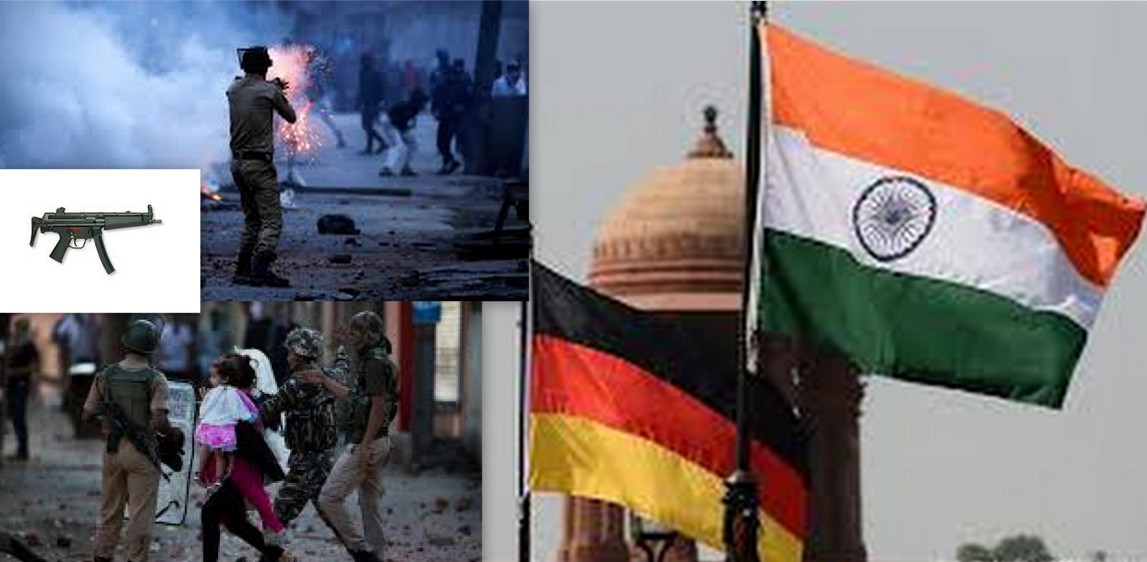Small arms export of Germany to India has hit a barrier due to concerns over the human rights record of government forces’ in Jammu and Kashmir, as reported by the Telegraph newspaper. Since the abrogation of Article 370 in J&K on August 2019, there have been reports of clampdowns and choking of the internet services in the erstwhile state. The region which earlier was a state, but now is formed of two union territories, has seen an increased number of cases of violence since 2016, which has led to heightened troops deployment to contain and normalize the situation. In parallel, as a consequence of this development, there have been allegations of violations of human rights by the troops, especially due to the continued imposition of ‘Armed Forces Special Powers Act’.
The Kolkata-based newspaper, Telegraph quoting two Indian security officials familiar with the bar on German small arms producers reported that these companies had failed to obtain export licences from their government on account of the “poor human rights record” in Kashmir.
Reports have said that German arms manufacturer Heckler and Koch, whose MP5 submachine guns have been part of the armoury of the National Security Guards (NSG) and Marine Commando (Marcos) units, has withdrawn from the Indian market saying that it lacked approval from the German government.
“After being rebuffed by Germany, the defence ministry has decided to procure US-made assault rifles,” a security official said.
Germany is India’s sixth-largest trading partner and its largest trading partner from the European Union.
From 2014 to 2018, India was the world’s second-largest importer of major arms and accounted for 9.5 percent of the global imports, according to a report published by the Stockholm International Peace Research Institute in 2019.
According to the report, Russia accounted for 58 percent of Indian arms imports between 2014 and 2018, while Israel, the US, and France too increased their arms exports to India during this period.
German regulations and covenants restrict, and often prohibit, arms sales to nations or regions where their use might cause direct or collateral damage to civilian populations and institutions.
In November 2019, three months after GOI had revoked Jammu and Kashmir’s special status and restricted movement and communication, Germany had expressed reservations about the clampdown and concern for the people of the region.
Germany had earlier too restricted arms export to India citing poor human rights records in states such as Gujarat, Manipur, Jammu and Kashmir, Andhra Pradesh, and Maharashtra.
A defence ministry official recalled that during the Kargil conflict of 1999, Germany had halted technology transfer for India’s indigenously made Advanced Light Helicopter Dhruv and withheld replacement parts and supplies for German equipment.
An Intelligence Bureau official had disclosed to the Newspaper that a Belgian arms manufacturer too had recently walked out of a deal to supply arms to India’s army amid concerns in the Belgian government that the weapons would be used in Jammu and Kashmir.
Belgium’s FN Herstal had signed the Rs 70-crore deal in 2020 to supply small arms and assault rifles to the army’s Special Frontier Force (SFF).
What is SFF
HQ-ed at Chakrata, Uttarakhand, the SFF was established in 1962 with Tibetan refugees for covert operations behind Chinese lines. Since the 1950s, the Central Intelligence agency (CIA) had been training Tibetan guerrillas to counter the Chinese forces in Tibet. Around the same time, the CIA and Indian IB had established the Mustang Base in Nepal. The Mustang rebels brought the current and the 14th Dalai Lama to India, who is currently living, in McLeod Ganj, Kangra in a self-imposed exile. The CIA and IB had then partnered to train the 5,000-strong force of Tibetans to counter any operations carried out by China, which led to the formation of SFF. In the year 1971, the SFF had helped the Indian Army to advance ahead during the war with Pakistan to neutralize the Pakistani Army Positions in Eastern Pakistan (now Bangladesh) using links with MuktiBahini.
SFF, also known as establishment-22 is a part of the set-up under the external intelligence agency of India, R&AW-Research & Analysis Wing, but, when deployed with the army, it comes under the military’s operational control. The army prefers to keep the relationships with SFF and MI under wraps.
(Taken from a story in The Telegraph)





